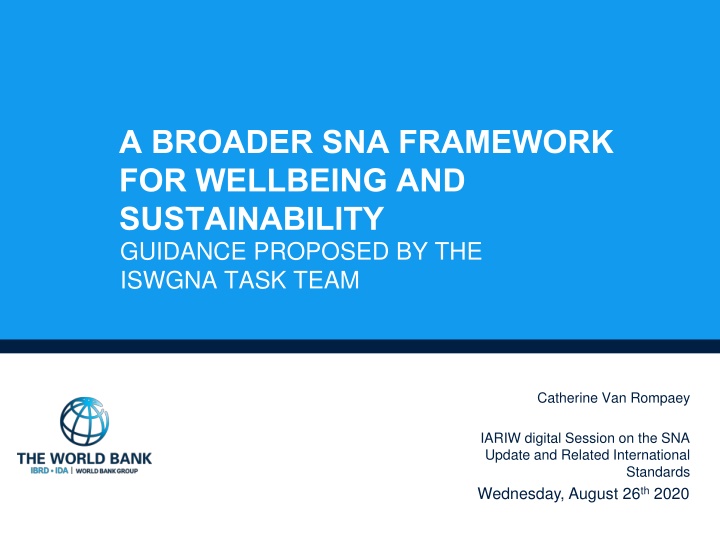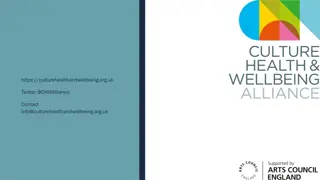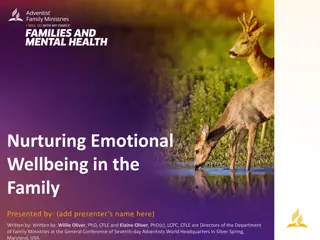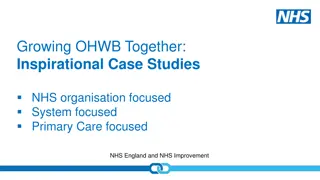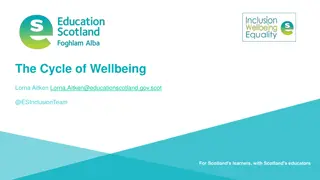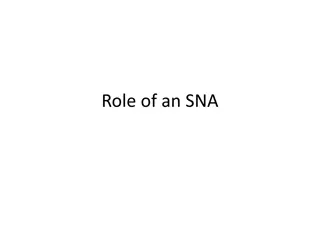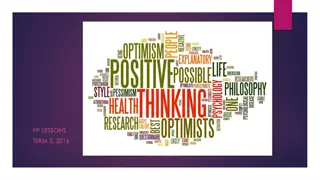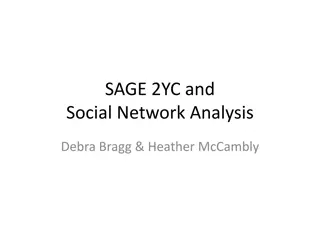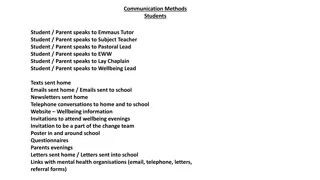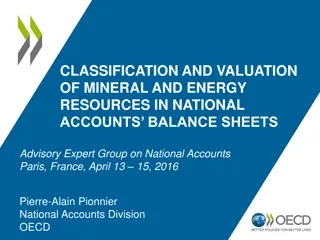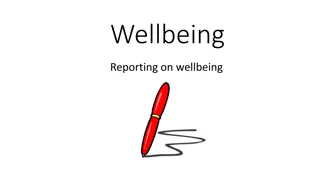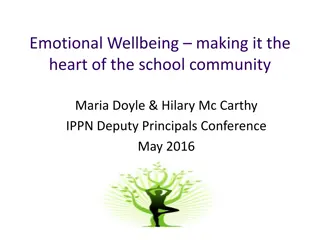Proposed Broader SNA Framework for Wellbeing and Sustainability Guidance
The proposed broader System of National Accounts (SNA) framework aims to redefine how we measure societal progress, shifting focus from GDP to multidimensional indicators like wellbeing and sustainability. Recommendations include evaluating income and consumption, emphasizing the household perspective, and broadening income measures. The call for expanded SNA guidance reflects a growing recognition of the need for a more comprehensive framework to analyze interrelations, tradeoffs, and win-wins in the face of globalization and digitalization.
Download Presentation

Please find below an Image/Link to download the presentation.
The content on the website is provided AS IS for your information and personal use only. It may not be sold, licensed, or shared on other websites without obtaining consent from the author.If you encounter any issues during the download, it is possible that the publisher has removed the file from their server.
You are allowed to download the files provided on this website for personal or commercial use, subject to the condition that they are used lawfully. All files are the property of their respective owners.
The content on the website is provided AS IS for your information and personal use only. It may not be sold, licensed, or shared on other websites without obtaining consent from the author.
E N D
Presentation Transcript
A BROADER SNA FRAMEWORK FOR WELLBEING AND SUSTAINABILITY GUIDANCE PROPOSED BY THE ISWGNA TASK TEAM Catherine Van Rompaey IARIW digital Session on the SNA Update and Related International Standards Wednesday, August 26th 2020
Context As the overarching macroeconomic measurement framework, the boundaries of the System of National Accounts define what we know as the economy This has real world impacts on decision making, shaping narrative on what's counted as progress While not designed for this purpose, its headline indicator, the Gross Domestic Product, is often misused to represent societal progress Proliferation of alternatives over decades modify/expand these measures to address wellbeing, sustainability and the negative externalities of economic activity Recent discussions reflect widely-held view: wellbeing and sustainability are complex multidimensional phenomena Measurement warrants a broader framework to analyze interrelations, tradeoffs and win-wins Facing a new economic reality with globalization and digitalization Production aggregates less indicative of the wellbeing of households Increasing polarization of income, consumption and wealth 1
Existing material Stiglitz-Sen-Fitoussi Recommendations 1. 2. 3. 4. 5. When evaluating wellbeing, look at income and consumption rather than production Emphasize the household perspective Consider income and consumption jointly with wealth Give more prominence to the distribution of income consumption and wealth Broaden income measures to non-market activities SNA Guidance on Satellite Accounts Optional mechanisms to elaborate issues of social interest Linked to, but distinct from, central framework Expansion to relevant non-monetary units Social Accounting Matrices (SAMs) CES In-Depth Review of Satellite Accounts Proliferation of specialized economic accounts prompted reexamination Distinguish thematic accounts (eg Tourism) from those addressing wellbeing and sustainability Recommendation to ISWGNA to prepare guidance on expanded SNA framework 2
Wellbeing dashboards and indicator frameworks OECD HOW S LIFE? INDICATOR FRAMEWORK Outside the macroeconomic statistics sphere, Stiglitz-Sen- Fitoussi gave impetus to the development of multidimensional wellbeing dashboards and indicator frameworks. 3
Sustainable Development Goals 17 interconnected goals, adopted by UN member states, along with their associated indicators coalesce local policy target setting in many areas of the world and warrant consideration in a broader SNA framework 4
Comprehensive or Inclusive Wealth Gaining momentum as complement to economic indicators on current wellbeing, offering new insights on its sustainability over time Augment traditional national wealth concepts of produced and financial capital to include natural and human capital No attempt so far to monetize social capital (trust, cooperation, civic engagement) Recent examples demonstrate feasibility of implementing concepts for a wide range of countries with differing levels of development World Bank s Changing Wealth of Nations 2018 United Nations Environmental Program (UNEP) 2018 Inclusive Wealth Report 5
Perspectives on broadened SNA framework Andre Vanoli: The Future of the SNA in a Broader Information Perspective Conceptual and measurement issues for an extension of SNA framework into four distinct spheres: Economy, Nature, People and Society Issues with equivalent transaction values for monetization Examines feasibility of fully integrated accounting system Rutger Hoekstra: Replacing GDP by 2030: Towards a Common Language for the Wellbeing and Sustainability Community Proposes an elaborate interdisciplinary framework, encompassing a body of science outside traditional welfare economics (environmental, demographic, other social sciences). Details multiple dimensions including physical, spatial, demographic and time use accounts, distributional analysis. Peter van de Ven: Measuring Economic Wellbeing and Sustainability: a Practical Agenda for the Present and Future Overlays measure of pragmatism, illustrating key issues with international results. Proposes greater emphasis on household sector with measures already available, and advocates a feasible approach to advancing measurement, drawing on international guidance available for environment, health, education and time use, without a strict requirement for monetary valuation. 6
Proposed guidance: A pragmatic way forward Elaborate overarching framework with linkages to microdata would be desirable, but perhaps not achievable for next SNA update More realistic goal is regular compilation of extended modules, drawing on body of guidance already available Flexibility in frequency of compilation, integration of non-monetary measures as appropriate Five areas of consideration 1. Distribution of household income, consumption saving and wealth 2. Unpaid household service work 3. Labour, education and human capital 4. Health and social conditions 5. Environmental-economic accounting 7
Guiding principles for the SNA expansion 1. 2. Expansion restricted to economic (material) wellbeing and sustainability. Changes to central framework will not compromise current key applications (e.g. by central banks and treasuries, for economic and fiscal policy or monitoring, business cycles). Leverage the comparative advantages of the SNA as a coherent integrating framework, identifying linkages and enabling integrated analysis. No one single indicator featured, rather elaborations or variants developed in each domain. Non-monetary measures integrated as appropriate to facilitate enhanced analysis. Focus on outputs, allowing for analytical linkages to possible outcomes not in scope. 3. 4. 5. 6. 7. To the extent possible, expansion in each domain to address the full sequence of accounts, including production, income, consumption and wealth accumulation. To the extent possible, design to take into consideration future development of a more fully elaborated, optimal framework. The expansion to seek a broad correspondence with wellbeing indicator frameworks, such as OECD How s Life? or the Sustainable Development Indicators. 10. The broadened framework will leverage guidance in well-developed satellite account frameworks already available, subject to broad consultation, testing and implementation. 8. 9. 8
Highlights: Households unpaid service work Accounts for non-market activity performed within and between households without monetary compensation for broader measures of economic growth and living standards Third-party criterion Explores measurement issues for collection of time use data Alternate approaches to valuation: Input approach: value of labour and capital at replacement cost Output approach: services valued at market prices Extended GDP measures Optional parallel time-based accounting 9 Footer Information
Highlights: Labour, education and human capital Proposed labour accounts elaborate labour a parallel manner to other inputs (produced capital, intermediate inputs) Characteristics of jobs, people, volume (hours) and payments Extended accounts for education and training Stock estimates of human capital with demographic dimensions (gender, age, educational attainment 10
Next steps Finalization of preliminary guidance in each domain Better integrate measures for a coherent set of proposals Align classifications and articulate linkages, among components and with traditional framework Consider additional extended concepts integrating elements across domains Consultation and refinement (IARIW, UNECE, Advisory Expert Group on National Accounts) Challenge to determine optimal balance between ideal set of measures and feasibility of broad, generalized implementation. To be informed by ongoing consultation and experimentation by NSOs, and in- depth discussions with the policy and research communities. 11 Footer Information
The Task Team on Wellbeing and Sustainability Co-Chairs: Catherine Van Rompaey (World Bank), Carol Coy (Statistical Institute of Jamaica) Secretariat (OECD): Peter van de Ven, Jorrit Zwijnenburg, Virginie Elgrably Broader Framework on Wellbeing and Sustainability Catherine Van Rompaey (World Bank), Lead Carol Coy (Statistical institute of Jamaica), Ivo Havinga (UNSD), Rutger Hoekstra (MetricsfortheFuture.com), Michael Smedes (Australian Bureau of Statistics), Gabriela Saborio Munoz (Costa Rica Statistics Department), Hermanus Smith (UNSD), Peter Van de Ven (OECD), Branko Vitas (Australian Bureau of Statistics) and Jorrit Zwijnenburg (OECD). Distributions of Household Income, Consumption and Wealth Amanda Seneviratne (Australian Bureau of Statistics), Lead Lucas Chancel (Paris School of Economics), Vania Etropolska (UNECE), Dennis Fixler (US BEA), Hakam Jayyoussi (Eurostat), David Johnson (University of Michigan), Margarida Martins (IMF), Andrea Neri (Banca D Italia), John Sabelhaus (US Fed), Pierre Sola (ECB), Ani Todorova (Eurostat), Richard Tonkin (UK ONS), Jose Valdes Martinez (World Bank), Dominic Webber (UK ONS) and Jorrit Zwijnenburg (OECD). 12
The Task Team on Wellbeing and Sustainability Unpaid Household Service Work Chris Payne (UK Office for National Statistics), Lead Carlotta Balestra (OECD), Tihomira Dimova (UNECE), Vania Etropolska (UNECE), Nancy Folbre (University of Massachusetts), Jonathan Gershuny (Centre for Time Use Research), Lisbeth Rivas (IMF) Peter van de Ven (OECD) and Dominic Webber (UK ONS) Labour, Education and Human Capital Michael Smedes (Australian Bureau of Statistics), Lead Ann Lisbet Brathaug (Statistics Norway), Barbara Fraumeni (Central University for Finance and Economics, Beijing),Wulong Gu (Statistics Canada), Patrick O Hagan (consultant, former Statistics Canada), Paolo Passerini (Eurostat), Alessandra Righi (ISTAT), Gueorguie Vassilev (UK ONS) and Peter van de Ven (OECD) Health and Social Conditions Dylan Rassier (US Bureau of Economic Analysis), Lead Ann Lisbet Brathaug (Statistics Norway), Elisabeth Hopkins (Statistics Sweden), Ciara O Shea (Central Statistics Office Ireland), Paolo Passerini (Eurostat), Maria Pettersson (Statistics Sweden), Lisbeth Rivas (International Monetary Fund) and Rachel Soloveichik (U.S. Bureau of Economic Analysis). 13
The Task Team on Wellbeing and Sustainability Environment-Economic Accounting Mark de Haan (Statistics Netherlands), Lead Alessandra Alfieri (UNSD), Pablo Castaneda (World Bank), Adam Dutton (UK ONS), Bram Edens (UNSD), Dennis Fixler (US Bureau of Economic Analysis), Ra l Figueroa D az (INEGI, Mexico), Francisco Guillen (INEGI, Mexico), Glenn-Marie Lange (World Bank), Carl Obst (consultant), Viveka Palm (Statistics Sweden), Sjoerd Schenau (Statistics Netherlands), Anton Steurer (Eurostat), Joe St Lawrence (Statistics Canada), Jim Tebrake (IMF), Gemma Thomas (UK ONS) and Peter van de Ven (OECD). 14 Footer Information
